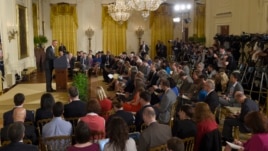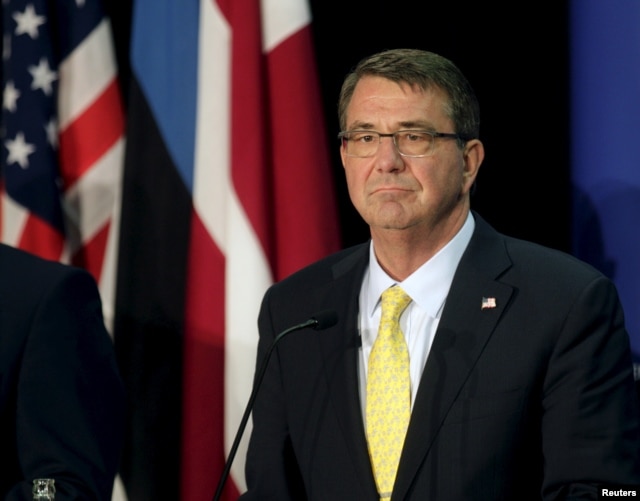Obama: ‘Iran Deal Makes America, World Safer’

President Barack Obama staunchly defended the historic deal that aims to restrain Tehran’s nuclear development program Wednesday, saying it represents the world’s best «means of ensuring Iran does not get a nuclear weapon.»
Seeking to sell the Iran nuclear deal to skeptical U.S. lawmakers and the American public, Obama insisted the landmark agreement is also the best way to avoid a nuclear arms race and more war in the Middle East.
At the nationally televised White House news conference, the president repeated his conviction that the pact «cuts off every single path» for Iran to build a nuclear bomb. He also said the deal makes the United States, its allies and the world «safer and more secure.»
He said if the U.S., through the congressional review process, misses the chance to approve the deal, «history will judge us harshly.» He said another opportunity to complete a deal with Iran «may not come in our lifetime.»
Obama also called U.S.-led negotiations with Iran «a powerful display of American leadership,» emphasizing the increased transparency the agreement entails on part of International Atomic Energy Agency (IAEA) inspectors, which he described as the «largest inspection regime in history.»
«Without a deal, the international sanctions regime will unravel, with little ability to re-impose it,» he said. «With this deal, we have the possibility to peacefully resolve a major threat to regional and international security.»
Without a deal, Obama said there would have been a risk of more fighting in the Middle East, and that other countries in the region would feel compelled to pursue their own nuclear programs «in the most volatile region in the world.»
After Iran and six world powers sealed an accord in Vienna on Tuesday, White House officials reiterated their long-held belief that robust debate over the deal would follow in Congress, where it faces wide opposition from Republican lawmakers and Republican presidential contenders seeking to replace Obama when his second term concludes in 2017.
Eradicating the prospect of nuclear weapons in Iran is something Obama has described as an objective shared by international and domestic entities alike, including Democratic and Republican members of Congress.
Lengthy Congressional battle
Kicking off what is expected to be a lengthy campaign to lock in approval of the historic deal, Vice President Joseph Biden went to Congress at 9 a.m. Wednesday for a closed-door meeting to brief minority Democrats in the House of Representatives.
One lawmaker quoted Biden as saying that «nothing in this agreement takes the military option off the table» for an attack against Iran if it violates the deal and starts building a nuclear weapon. Another said the vice president contended that «the entire sanctions regime» that has been imposed against Iran to pressure it to complete a deal «would crumble» if the pact negotiated by the United States and five other world powers is not implemented.
Once Congress is handed the formal agreement, it has 60 days to consider whether to reject it, and even it does, Obama has promised to veto such legislation. If that were to happen, both houses of Congress would then have to produce a two-thirds majority to override the president’s veto.
One vocal Republican opponent of the deal, Senator John McCain, who lost the 2008 presidential election to Obama, acknowledged to VOA that it «is likely» that the deal will eventually be approved.
Opponents of the agreement continued their barrage of attacks Wednesday. One leading Republican presidential contender, real estate mogul Donald Trump, called it a «disgrace,» while another candidate, Senator Lindsey Graham, said it was «a terrible idea.»
In the Middle East, Israeli Prime Minister Benjamin Netanyahu condemned Obama’s assessment of the deal, which contends that it will cut off all pathways Iran has to develop a nuclear weapon, as «a stunning, historic mistake.»
Best option
In an interview with the New York Times, Obama said the agreement achieves the basic goal that even critics agree with: that Iran should not have the capacity to develop a nuclear weapon.
«This is our best option to make sure that not just for the first 10 years, but for years afterwards, we have a verifiable inspection regime that ensures they do not obtain a nuclear weapon,» the president said. «That is worth an enormous amount in terms of our national security, and Israel’s national security and our other allies’ national security in the region. It also prevents the possibility of a nuclear arms race in the region.»
Obama said whoever is president 10 or 15 years from now will have the same ability to use military action or to impose new sanctions, but with the agreement they will also have more insight into Iran’s nuclear program and «international legitimacy» to act against any violations.
U.S. Secretary of State John Kerry, who spearheaded efforts by the so-called P5+1 group of the U.S., Britain, China, France, Russia and Germany, called the accord a «good deal.»
Israel, Gulf allies
Obama also mentioned the need to work with Israel and Gulf allies to guard against the possibility of Iran using money unlocked by sanctions to sponsor terrorism.
On Tuesday, the president discussed the Iran deal with various allies in the Middle East, including Saudi Arabia’s King Salman and Crown Prince Mohammed Al Nahyan of the United Arab Emirates. The White House said Obama recalled a summit earlier this year with Persian Gulf nations, and reiterated that the U.S. remains committed to working with them to counter Iran’s destabilizing activities in the region.
The prospect of an increasingly assertive Iran has seen Gulf states build up their militaries, largely with U.S. weaponry.
Defense chief heading abroad
Next week, U.S. Defense Secretary Ash Carter will head to the Middle East to try to reassure allies that the Iran deal will not undermine America’s commitment to their security. As of late Tuesday, the White House had disclosed only one stop: Israel, where Prime Minister Benjamin Netanyahu has already condemned the accord as «a stunning, historic mistake.»
Via Twitter, Iranian Foreign Minister Mohammad Javad Zarif spoke of the deal as a new diplomatic beginning for the countries involved, calling it “not a ceiling but a solid foundation. We must now begin to build on it.”
Meanwhile, French Foreign Minister Laurent Fabius said Wednesday that he will visit Iran, after being invited by Zarif at the close of the negotiations. Fabius did not say when the trip would take place.
Portions of this report are from Reuters.



